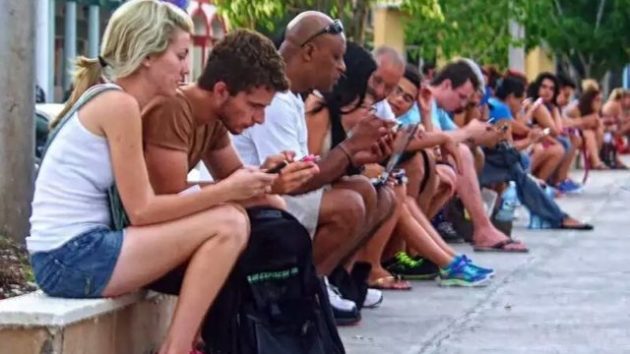Let Social Media Boost the Cuban Economy by Sarah Odessa Blow
In June, Ripl, a social media marketing company, published a study concluding that social media is ranked the most effective way to “attract new customers and connect with current ones” by American small businesses. While skeptics have long criticized social media’s effectiveness and return on investment (ROI), the plethora of evidence proving the values of social media for small businesses has begun to change the discussion.
Many businesses in the US have realized this and begun using social media to further their product and brand. But in places like Cuba, small business owners are denied the ability to do so.
Only 16% Can Get Online
The Cuban government has had a long history of regulating and restricting the internet. In their yearly “Freedom on the Net” report, Freedom House concluded that high prices, extensive government regulation, and slow connectivity are all preventing Cuban citizens from accessing online content. To worsen the blow, most Cuban citizens only have access to the “intranet,” a web space controlled by the government, and not the wide open internet most of us know and love.
While unregulated access to the internet would provide an endless list of advantages for the Cuban people, social media business development would be one of the biggest.
The Cuban government regulates social media via both access control and content control. Access control refers to the ability Cuban citizens have to log onto the internet: limited broadband, restricted WiFi, and other infrastructure shortcomings prevent most of the population from accessing the web. In a recent poll conducted by Bendixen & Amandi International, only 16 percent of Cubans said they could use the internet. A majority of those people only have access at work and school. If someone who lives in Cuba can actually log onto the internet, they face the second level of regulation: content control.
Most social media sites cannot be accessed through the intranet. Of the 16 percent of Cubans who can get online, only 40 percent said they had access to social media platforms. To appease the public, the government has made fake websites that mimic the look and feel of social platforms.
Mashable reported that the Cuban government created “its own versions of Wikipedia and Facebook” called Ecured, and Social Red. While larger social media sites like Twitter and Facebook are not banned from the country, they cannot be accessed on the small “intranets” that only some Cubans can access. The replacement platforms do not provide the social connections the Cuban people need to expand their small businesses online domestically and internationally.
While the Cuban government claims it wants to expand economic opportunity for Cuban citizens, there has been hardly any effort to remove content control and increase access.
Over 37 percent of Cubans want to start their own business within the next five years. Putting aside the innumerable benefits an open social media system would have for Cuban politics, journalism, human rights, and free speech, access to social media would spark the economic growth the Cuban people want.
Bypassing Government
Social media platforms are helping Cubans get around restricted internet access.
Cuban entrepreneurs who recognize the value social media plays in their small business development are using sites like Trip Advisor and AirBnB. Since the government has given them permission to operate in Cuba, businesses can list their products for potential tourists to view.
Due to restricted infrastructure, accessing the internet to create a listing on TripAdvisor or AirBnB is extremely difficult, which means business owners have to go to lengthy extents purchasing VPNs, traveling long distances etc., to connect to the web.
Dr. Joseph L. Scarpaci, Executive Director at the Center for the Study of Cuban Culture and Economy, argues that these social media platforms are helping Cubans get around restricted internet access, business regulations, and a general inability to communicate with potential customers domestically and internationally. Scarpaci says,
Today, with the advent of Internet sites like Trip Advisor, some Cuban entrepreneurs are attempting to overcome these obstacles using social media that is hosted on servers located abroad.”
An example of this is an app developed by Cuban entrepreneurs called A la Mesa which functions a lot like OpenTable, a popular US-based app used to find and make reservations at local restaurants. A la Mesa offers a directory and reviews of local Cuban restaurants.
To bypass the Cuban government’s access limitations, the A la Mesa app provides services that do not require internet access like downloadable lists of local restaurants and distributes content that may be censored via email. With social media, A la Mesa’s business owners, and others throughout Cuba could create pages to advertise their content, connect with other businesses, and sell products remotely.
If the Cuban government wants to foster small business growth, they need to allow more access to social media platforms. There is a huge hunger for growth in Cuba. The people are driven, excited, and entrepreneurial; the problem is Cuban citizens don’t have access to the tools they need to expand and market their small businesses.
While expanding access to social media will not remove heavy restrictions on business property ownership or free speech, it will give those 37 percent of Cubans who want to start their own business a platform to reach potential consumers, and further economic development.

Sarah Odessa Blow
Sarah Odessa Blow is a Communications Fellow at the TechFreedom Institute. She attends Liberty University, where she is pursuing a BS in Business Communications and Marketing.



Trackbacks & Pingbacks
[…] Let Social Media Boost the Cuban Economy by Sarah Odessa Blow […]
Leave a Reply
Want to join the discussion?Feel free to contribute!